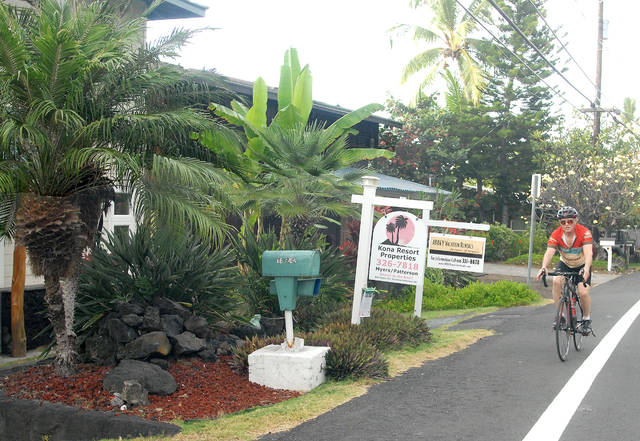Vacation rental operators will have a few extra months to get their paperwork together, now that the County Council moved the effective date for a bill regulating their use to April 1.
Bill 108 is an attempt to prohibit unhosted short-term rentals in residential and agricultural zones, while allowing them in hotel and resort zones as well as commercial districts. Existing rentals in disallowed areas would be grandfathered in after obtaining a nonconforming use certificate. The certificate would run with the property, provided it is renewed annually.
The bill applies to residences rented for 30 days or less where the owner doesn’t live on premise. Other types of rentals, such as bed and breakfast operations and home-stays, aren’t addressed in the bill. Nor are primary residences where the owner lives in the property most of the year and rents it out other times.
All vacation rentals will be required to register with the county, showing that transient accommodations taxes, general excise taxes and property taxes are paid in full. Short-term vacation rentals may be established only within a dwelling that has been issued final approvals by the Building Division for building, electrical, and plumbing permits, under the revised bill.
Registration must be completed within 180 days of the April 1 effective date.
“Bill 108 was in no way intended to completely do away with vacation rentals,” said North Kona Councilwoman Karen Eoff, one of the bill sponsors. “It’s an attempt to regulate just enough so it’s not overly cumbersome. … I think we’ve taken a very fair and well balanced approach.”
The council approved Bill 108 on first reading Friday on a 5-1 vote, with Puna Councilwoman Eileen O’Hara voting no and Puna Councilwoman Jen Ruggles, Kohala Councilman Tim Richards and Hilo Councilwoman Sue Lee Loy absent. The final reading is set for Nov. 20.
The council vote came after more than 30 people testified, most raising concerns that their own vacation rental operations or those of their neighbors are threatened by the bill. Others, primarily from West Hawaii, raised complaints about vacation rentals taking over their formerly quiet neighborhoods.
“It doesn’t look at the unique differences between Puna and Kona between East Hawaii and West Hawaii,” said Jack Miller about the bill, testifying from Hilo.
Hilo Councilman Aaron Chung agreed with that sentiment, while voting in favor of the bill. He suggested the administration use the flexibility the law allows to work with each person’s specific issues.
“This is one of those really, really complex bills. … It’s not a perfect bill. Nobody ever said it was a perfect bill,” Chung said. “One thing about our county, one size doesn’t fit all.”
Regulating vacation rentals on land in the state agriculture district remains a sticking point. State law requires all dwellings on farm lots that were created after June 4, 1976, be farm dwellings only. Because of the overriding state law, county planning officials say they can’t issue nonconforming use certificates on agriculture properties created after 1976.
Axel Kratell, who rents out a lower floor of his home on the family’s Hamakua farm, recently returned from a conference on Maui where he said he was struck by the proliferation of vacation rentals and “gentleman estates” on farmland. He urged the council to protect agricultural land while allowing farmers to supplement their income by hosting paying guests.
Some testifiers ask the council to slow down the bill by first completing an economic impact statement and a task force of stakeholders to help shape the legislation.
Others asked to change the bill to exempt rentals where the owner lived in the same community, rather than on the property. Susan Barrackman, who owns a vacation rental in Puna and is in the process of buying a second one, threatened to sue if the county takes away her property rights.
In the long term, the restrictions could be modified by changes to the county general plan, with overlays for specific areas such as Volcano village and Pahoa town, said Planning Director Michael Yee. Changing agriculture designations to rural designations would be a good step, he said.
O’Hara tried, unsuccessfully, to amend the bill to allow Puna districts an extra five years before the bill took effect in order to recover from the volcano emergency. She said 96 percent of Puna is agricultural land. She said the area lost 400 short-term vacation rentals because of the lava flow.
“It is an economic death for Puna,” O’Hara said.
“We have lost close to half of our inventory and allowing the return of some of that is essential to the economic recovery of my district. … This district is dying and this is the final death blow.”
Deputy Corporation Counsel Amy Self, however, told her that couldn’t legally be accomplished.
“You cannot pick out just one district to eliminate from a zoning regulation that applies countywide,” Self said.






